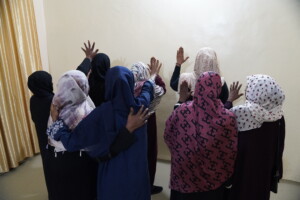Sudan criminalises female genital mutilation
The Sudanese government is to criminalise female genital mutilation (FGM). A special article will be added to the country’s criminal law.
 The cover of a 2016 Unicef report on female genital mutilation (Unicef)
The cover of a 2016 Unicef report on female genital mutilation (Unicef)
The Sudanese government is to criminalise female genital mutilation (FGM). A special article will be added to the country’s criminal law.
The Sudanese Ministry of Foreign Affairs welcomed the decision. In a statement on Tuesday it said that the decision represents “an important positive development”. It sees the addition to the criminal law as an implementation of Chapter 14 on Rights and Freedoms of the Constitutional Declaration, signed by the then ruling Transitional Military Council and the opposition Forces for Freedom and Change (FFC) in August 2019.
The ministry said that full enforcement of this law requires concerted efforts and tight coordination with all partners, especially community groups and civil society organisations. It also seeks international partners wishing to provide help on this topic.
In November 2018, Nahid Jabrallah, the director of Sima Centre for the Protection of Women and Children, said that 65 per cent of all Sudanese women suffered from female genital mutilation, called Pharaonic Circumcision in Sudan . She also said that 37 per cent of all girls marry while still minor.
According to the 2010 Sudan Household Survey 88 per cent of all Sudanese women between 15 and 49 years old are subjected to female genital mutilation, traditionally and euphemistically called ‘female circumcision’. A reported trend in these survey was that it happens less among younger Sudanese women of 15-19 years old.
The traditional belief in Sudan is that cutting the external genitals of a girl, ensures the family honour and her prospects in marriage. However, the mutilation can lead to infections, and in worse cases, infertility, or complications during childbirth. It also greatly diminishes sexual pleasure for affected women.
The practice of FGM in Sudan was one of the reasons for researchers of the Thomas Reuters Foundation to rank Sudan as one of the worst countries for women’s rights.
The views on FGM have been shifting in Sudan over the past decades. In June 2015, legal experts demanded the formulation of a national law that prohibits FGM in all states of Sudan. The Sudanese government of ousted president Omar Al Bashir claimed to be working on such legislation in 2012.
Gynaecologists in 19th-century Europe and the United States removed the clitoris to treat insanity and masturbation. Clitoridectomy was performed in the United States into the 1960s to treat hysteria, erotomania and ‘lesbianism’.
The summary of the Unicef report that was used as illustration can be found here.
Radio Dabanga’s editorial independence means that we can continue to provide factual updates about political developments to Sudanese and international actors, educate people about how to avoid outbreaks of infectious diseases, and provide a window to the world for those in all corners of Sudan. Support Radio Dabanga for as little as €2.50, the equivalent of a cup of coffee.












 and then
and then